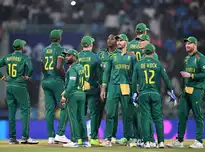
Should you put your ear to the doors of South Africa’s men’s players in their Dharamsala hotel rooms in the early hours of Monday morning you might hear something interesting. Yawps of ecstasy, for instance, wails of anxious excitement, or sighs of relief or resignation. To be clear, this will involve no body parts besides the eyes.
The Springboks, South Africa’s rugby union team, kick off their World Cup quarterfinal against France in Paris at 12.30am (IST) on Monday. Members of Temba Bavuma’s squad are likely to watch the match. They will do so primarily as supporters but also in the knowledge that, as long as the Boks keep winning, they will be able to sail under the radar at their own World Cup in India.
Similarly to Indians turning their full attention to Rohit Sharma’s team at the World Cup only once India were done winning a record 107 medals at the Asian Games, South Africans won’t put Bavuma’s team under proper scrutiny until the Springboks’ campaign has been completed. That could happen before breakfast time on Monday, or in one of the coming weekend’s semifinals, or indeed in the final on October 29.
The Boks have been to three World Cup finals and won them all. That, and the rise of black and brown matchwinners who have transformed rugby from its roots in the country as a game of, for and by apartheid’s white oppressors into a national treasure, has made the Springboks darlings of their society beyond sport.
Their cricket counterparts can only wonder what that feels like. They have never reached a final despite going into several World Cups among the stronger teams. Worse, they have crashed out of tournaments in ways the Boks never experience: they lose to teams who play better but they do not beat themselves.
Bavuma’s squad have lugged that history with them to India. But they haven’t collected it from the baggage carousel. Instead, they have left it to go round and round on a one-track journey to futility and irrelevance.
“We’ve had a brief conversation to say the past is the past,” Rob Walter said in Dharmsala on Saturday. “The only thing we can do is learn from it, and focus on what’s in front of us. If we do carry that burden it just uses up energy. We want to leave that where it was and put all our energy into preparing properly for the fixture and then being switched on when the fixture arrives.”
Walter spoke three days before his unbeaten side will try to add the Netherlands to Sri Lanka and Australia, teams they have taken points off so far in the tournament. Mention of the Dutch will ring alarms for South Africans, whose team suffered one of their infamous meltdowns against them in Adelaide in November on their way out of the T20 World Cup. This squad includes eight members of that XI. Would the Adelaide awfulness, which the Netherlands won by 13 runs, be on their minds on Tuesday? “No, not particularly,” Walter said. “It’s an opportunity to play the game the way we want to.”
Like South Africa did in Lucknow on Thursday, when they piled up 311/7 and sealed the Aussies’ heaviest World Cup loss by dismissing them for 177. That followed the World Cup record total of 428/5 South Africa made in Delhi last Saturday, when they bowled out the Lankans for 326.
Their handsome victory notwithstanding, Bavuma’s team conceded too many runs and fielded sloppily in their first game. They addressed both issues in the second match in impressively efficient fashion. The South Africans arrived in India with one of the better batting line-ups, but their bowling is considered a potential stumbling block – not least because Anrich Nortje has been ruled out of the tournament with a lumbar stress fracture. Thursday’s display challenged that view.
“It was a bowling win,” Walter said. “I know the batters did a great job to get us where we got to, but from a bowling perspective it was a clinical performance. And it really was started by Lungi [Ngidi]. That five-over spell in the powerplay was exemplary.”
Ngidi, always an intelligent bowler, looks leaner, fitter and stronger than ever. He induced David Warner to slap a catch to cover in his new-ball spell of five overs, which cost just five runs. At the Kotla, he started with a scoreless over before his next two sailed for 27 runs – all but one of them hit in fours and sixes by the rampaging Kusal Mendis. What was the difference between the two matches?
“Delhi is a bowlers’ graveyard; the ball flies,” Ngidi said after Thursday’s game, a reference to the Kotla’s belter of a pitch and its small, lightning fast outfield. “We knew it was going to be that way. Whatever criticism comes with that, we take it on the chin. The runs were always going to be high but we have an attack that takes wickets. We were a little bit rusty but it’s starting to show that the consistency is going to come the more we play.”
That level of realism will serve South Africa well. It also sets them apart from their predecessors, who have tended to come to the World Cup looking to kick down the door – not unlike the Springboks. Thing is, cricket is not rugby. That was stirringly proved in Marseille on Saturday by the Argentina players on the bench singing along with their team’s supporters in the crowd while they were behind late in their rugby World Cup quarterfinal against Wales, which Argentina won 29-17. Also, the Boks are good at kicking down the door.
At least the cricketers are not as disappointing as South Africa’s perennially poor men’s football side. Bafana Bafana have managed to successfully navigate the World Cup qualifying process – which is far more complex and difficult than in any other team sport – only twice in seven editions of the tournament, not considering the free pass they were given as hosts in 2010.
Bafana have won just two of their nine group matches and have never progressed beyond the first stage of a World Cup. Despite that, and unlike the Boks, who know exactly who and what they are, they suffer from a damaging hubris: they think they are significantly better than their performances and results indicate.
The cricketers don’t have that problem. They also don’t have the Boks’ success. They won’t be kicking down doors in the early hours of Monday morning. Instead, they’ll be behind them, yawping, wailing and sighing, like their own fans. And hoping, for more than one reason, that the Springboks keep winning.







